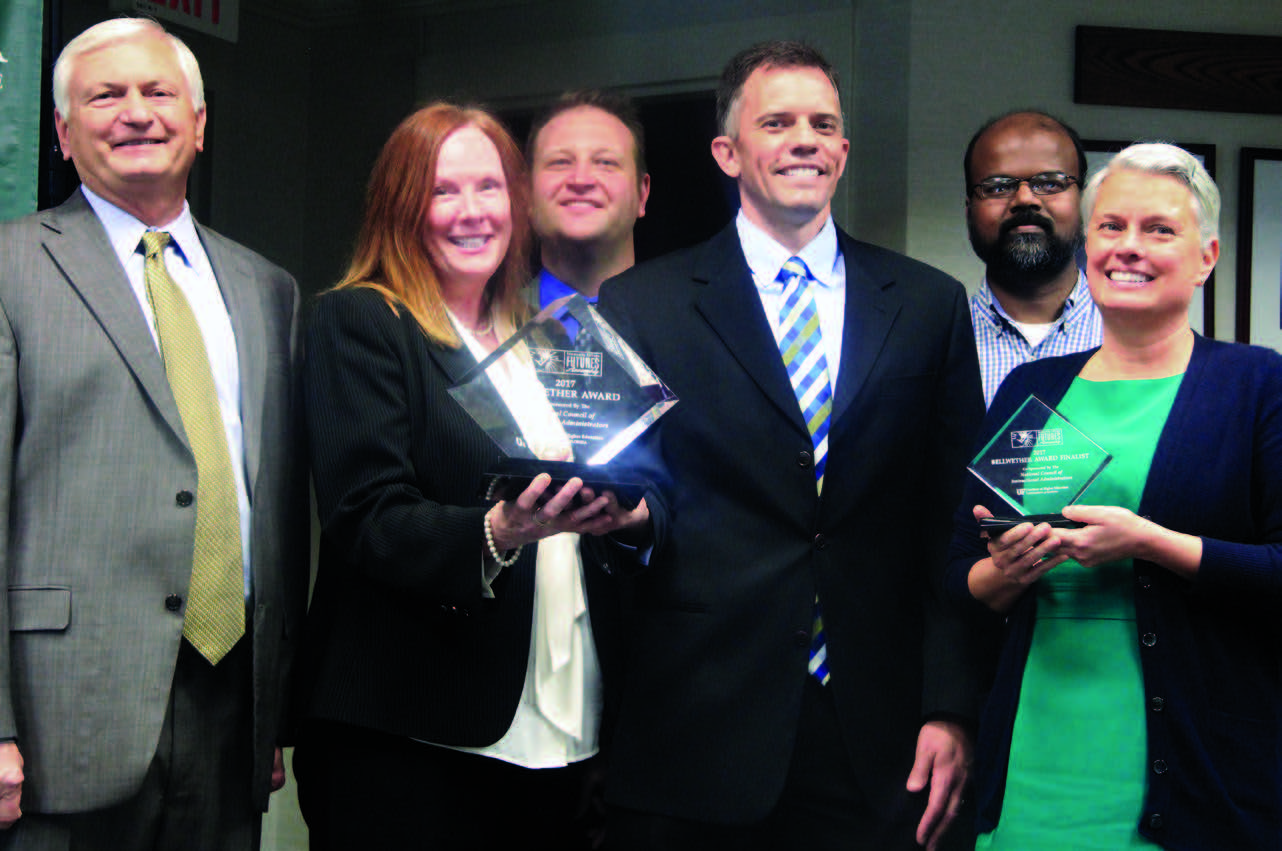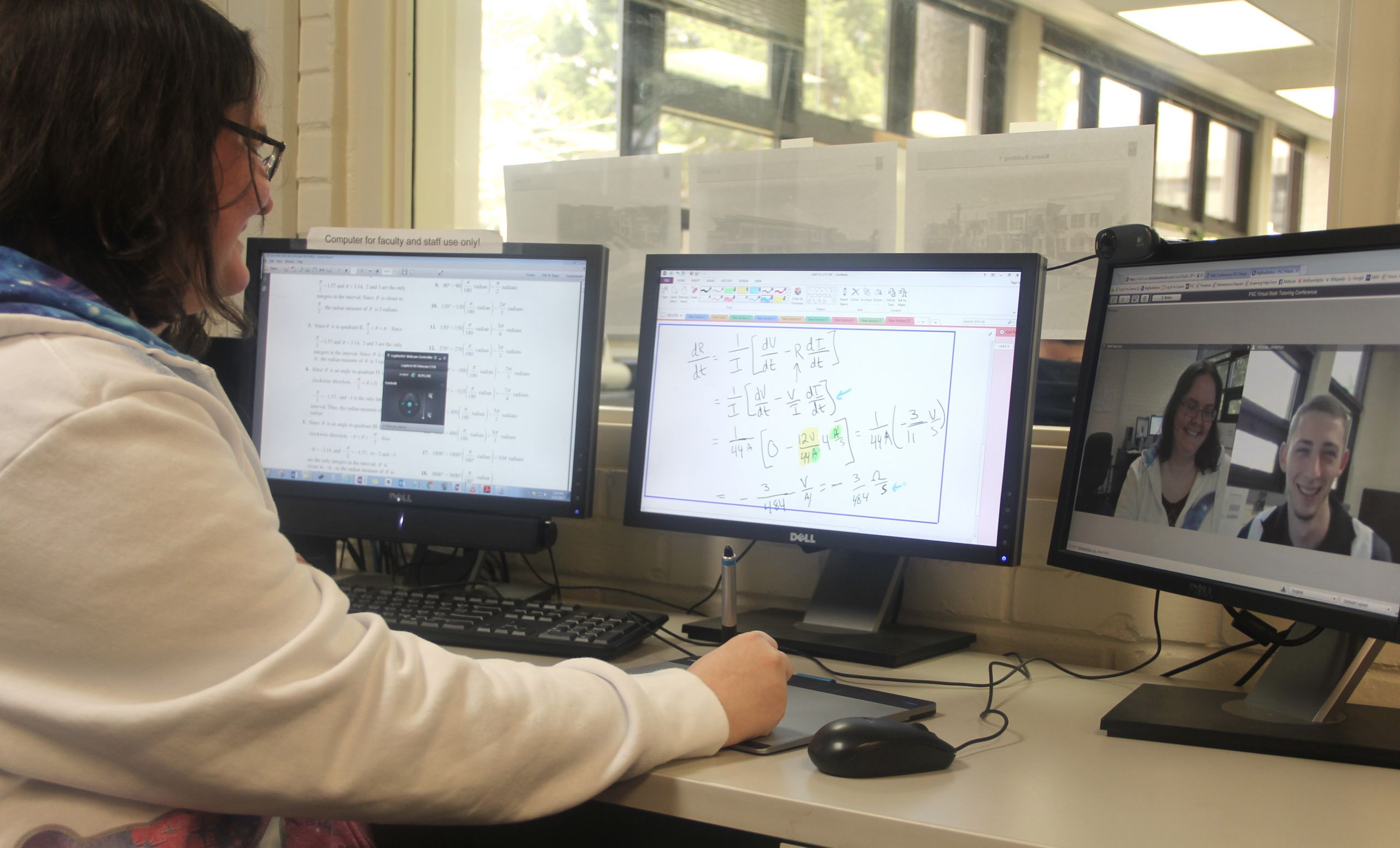
Pensacola State’s Virtual Tutoring Program won the 2017 Bellwether Award in the Instructional Programs and Services category. PSC has been selected as one of eight Bellwether Legacy Award Finalists to compete for the 2024 Legacy Award. Pictured are PSC President Ed Meadows, from left, Associate Vice President of Academic Affairs Brenda Kelly, Associate Vice President of Institutional Research and Enterprise Solutions Michael Johnston, Dean of Baccalaureate Studies and Academic Support Kirk Bradley, Physical Sciences Professor Vasanth Ramachandran and Vice President of Academic and Student Affairs Erin Spicer.
College received Bellwether Award in 2017 for Virtual Tutoring Program
Pensacola State College has been selected as one of eight Bellwether Legacy Award Finalists to compete for the 2024 Legacy Award.
The winner will be announced at the 30th Annual Community College Futures Assembly (CCFA), set for Feb. 25-27 in San Antonio.
The nationally recognized Bellwether Legacy Award identifies and honors an innovative community college program that demonstrates five or more years of student success. It is a replicable, scalable, equity-focused program with years of evidenced-based success.
In 2017, Pensacola State’s Virtual Tutoring Program won the Bellwether Award in the Instructional Programs and Services category – beating out more than 2,500 applicants and nine other top finalists.
“The Pensacola State College Virtual Tutoring Program began in Fall 2015 to improve student performance and student outcomes,” said PSC President Ed Meadows.
“Initially, virtual tutoring was available for intermediate algebra, college algebra, and introduction to chemistry and anatomy. However, it has expanded to include many other courses.”
The Virtual Tutoring Program now incorporates all Pensacola State mathematics, chemistry, physics, and writing emphasis courses. It is staffed by tutors with bachelor’s, master’s and doctoral degrees. The live site allows students to see, speak and interact with tutors from desktops, laptops, tablets or even smartphones.
Other Bellwether Award Legacy Finalists are Pima Community College and South Mountain Community College in Arizona, Blinn College District and El Paso Community College in Texas, Community College of Beaver County in Pennsylvania, Gaston College in North Carolina, and Hudson County Community College in New Jersey.
A Legacy Finalist is a community college program that scores highest in the first round of competition. During the CCFA, college teams can conduct presentations to a jury of anonymous judges and share how they significantly addressed a critical issue affecting community colleges.
The Pensacola State team will include Vice President of Academic and Student Affairs Dr. Erin Spicer, Dean of Baccalaureate Studies and Academic Support Dr. Kirk Bradley, and Associate Vice President of Institutional Research and Enterprise Solutions Michael Johnston.
PSC Director of Institutional Research Neil Gonzales said the virtual tutoring program has proven beneficial to struggling students at all levels.
“Students who have trouble grasping the concepts of College Algebra, as well as those enrolled in Calculus I, II and III, have found the extra help they needed in the program,” he said, noting these successes have propelled some graduates into careers in computer science, engineering and health care.
Gonzales added the Virtual Tutoring Program was also an invaluable resource for students during the COVID-19 pandemic.

Pensacola State College’s award-winning Virtual Tutoring Program is one of eight Bellwether Legacy Award Finalists to compete for the 2024 Legacy Award. Pictured is a tutor helping a student with calculus coursework.
“During the early days of the (COVID-19) pandemic, the College saw a strong participation in the Virtual Tutoring Program. The transition from in-person classes to totally online was difficult for some students, and the Virtual Tutoring Program helped,” he explained.
PSC Humanities and Social Sciences Department Head Scott A. Schackmann said a key strength of the Virtual Tutoring Program during the pandemic transition was its longstanding online presence ─ dating back to 2015.
“This established online framework provided students with a familiar and reliable resource during the challenging period,” he said. “The pandemic further amplified its significance, offering students remote access to well-trained and highly-educated faculty.”
Schackmann noted that while the core focus of virtual tutoring continues to revolve around mathematics, writing emphasis, physics and introductory chemistry courses, “the program’s inherent adaptability underscores its broader significance and untapped potential.”
Former and current PSC students credit the Virtual Tutoring Program with helping them succeed.
PSC alumna Linda Savage said she earned a “B” in College Algebra and passed a statistics course because of the program.
“I was a nontraditional student who was very intimidated by math,” recalled Savage, now 67 and retired. “Oh man, the Virtual Tutoring Program boosted me. I could logon anytime, and the tutors were outstanding. And with it being a one-on-one session, it helped me to grasp College Algebra.”
Savage added the results were “instant gratification.”
“I saw an immediate improvement in my grades once I started the tutoring sessions. It had been 20 years since I left (Florida) A&M, so I was a little rusty going back into the classroom,” said Savage, who earned a medical information coder/bill technician certificate from PSC in December 2015.
“Mastering College Algebra gave me the confidence to pursue my associate degree, and I had to take a statistics course. I passed that class with a good grade and received my Associate in Arts degree in May 2016.”
PSC nursing student Ted Williams agrees with Savage. He is enrolled in the Virtual Tutoring Program to get help with College Algebra.
“My tutor, Dr. (Tina) Bond, is excellent. She helps me understand the concepts of algebra. She can break things down and present them more simply than my professor. Every one of my test scores has gone up since I started the tutoring sessions,” he said.
An Alabama native, Williams, 29, earned a bachelor’s degree in criminal justice from the University of North Alabama in 2017. However, he never worked in the field.
“I was working for Pepsi (Bottling Company) in Alabama and transferred here for a job,” he said. “I decided to pursue a career in nursing because it is a field I am highly interested in.”
Williams is scheduled to graduate in Spring 2025 and recommends the Virtual Tutoring Program to all students needing help with college.
“This is my second time using the virtual tutors. I had a math class last semester and enrolled in virtual tutoring. It helped me succeed in that first math class and my College Algebra course,” he said, adding the sessions are convenient.
“I logon to virtual tutoring after I get off work, and the sessions have made a world of difference in my coursework and test scores.”
Taylor Price, a 2018 PSC graduate and now a system engineer at Howard Industries in Laurel, Mississippi, said he is living proof the Virtual Tutoring Program works.
Price took several Virtual Tutoring Program courses while earning an associate degree in pre-engineering.
“Mathematics, chemistry, physics, calculus, I did them all,” said Price, who went on to graduate magna cum laude with a bachelor’s degree in electrical engineering from the University of South Alabama in 2022.
“The Virtual Tutoring Program allowed me to work full-time to still provide for my family. Virtual tutoring was there at night when I could study, and I didn’t have a professor and had questions,” said the 33-year-old U.S. Army veteran.
Price said the first time he logged in, he talked to (Michael) Johnston, who helped guide him through some of his most challenging classes.
“The firm foundation I received at Pensacola State was critical to me doing so well at South Alabama. I developed outstanding study skills in chemistry and calculus. In engineering, you must apply the calculus that you learn. A lot of students learned what they needed to pass the test. I learned calculus,” said Price, who described himself as “not academic.”
After graduating with a 3.87 grade point average in May 2022, Price went to work for Howard Industries. This billion-dollar company offers products and services in four divisions: technology, power, lighting, and transportation.
Currently, Price works on control systems, power systems, designs and commissions systems, and reconnaissance.
“I even travel internationally to meet with others and gather data on emerging technologies,” said Price, who met his wife, Karley, while they were both PSC students.
She also earned an associate degree from Pensacola State and now works part-time at Howard Industries. The couple has a 6-year-old son and is expecting their second child this year.
“The one random night I logged in (the Virtual Tutoring Program), and Mike (Johnston) happened to be there, it was a game changer for my life,” Price said in closing.
In a prepared statement, Rose Martinez, director of the Bellwether College Consortium, said the Legacy Award is the consortium’s highest honor, and only past-recognized Bellwether programs can compete for this recognition.
“These finalists are extraordinary colleges that scaled solutions to tough challenges and documented five years or more of admirable success,” Martinez noted. “These challenges were often exacerbated by the COVID pandemic and addressed with analytics-supported implementation of historic modifications in instructional delivery and student support.”
Meadows said PSC has seen substantial improvements in student performance and outcomes and won the Bellwether for its data-backed success in helping students complete math and science courses with higher grades and lower withdrawal rates.
‘’Since the Fall 2015 Semester, over 25,500 Pensacola State students have used the College’s Virtual Tutoring Program for more than 17,000 hours,” said Meadows, who added the program results are far-reaching.
“Our Virtual Writing tutoring helps students with any writing assignment for any class they’re taking at PSC, so the list of courses we assist with is even longer ─ composition, literature, psychology, sociology, government, etc.”
In 2018, the Virtual Tutoring Program won a Florida College System Chancellor’s Best Practice Award and a League for Innovation In the Community College of the Year Award.
The Legacy Award competition is held at the Community College Futures Assembly every five years. Event co-sponsors include the National Council of Instructional Administrators, the National Council for State Directors of Community Colleges, and the National Council for Continuing Education and Training.
The CCFA convenes annually as an independent national forum for innovators to work as a think tank. It identifies successful responses to critical issues facing the future of community colleges and hosts its national Bellwether Award competition annually.
Visit the Bellwether College Consortium website for more information, bellwethercollegeconsortium.com, or email rmartinez1702@alamo.edu.

 PirateQ
PirateQ 